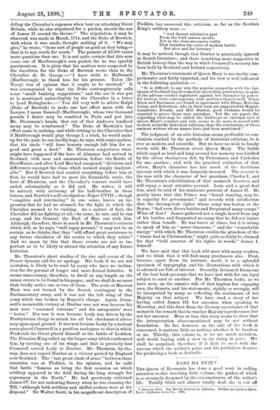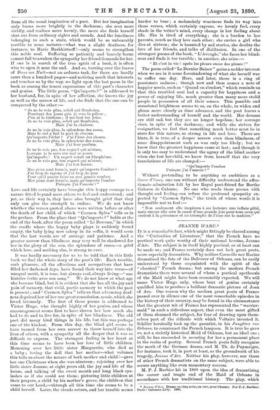DANS MA N17IT.*
THE Queen of Roumania has done a good work in calling attention to this touching little volume, the pathos of which is so strangely deepened by the circumstances of the writer's life. Totally blind, and almost totally deaf, she is cut off
• Dans tea Nuit. Par Ber•he Galeron de Calonne. Frame de Carmen Sylra. Paris : Alphonse Leinerre. 1890.
from all the usual inspiration of a poet. But her imagination only burns more brightly in the darkness ; she sees more vividly, and realises more keenly, the more she finds herself shut out from ordinary sights and sounds. And the loneliness belonging to such a state, which would be so unbearably terrible to some natures—what was a slight deafness, for instance, to Marie Bashkirtseff !—only seems to strengthen this noble soul. Suffering so patiently and bravely borne cannot fail to awaken the sympathy her friend demands for her. If one is in search of the true spirit of a book, it is often wise to open it near the end. And so, turning over the leaves of Dans ma Nuit—not an arduous task, for there are hardly more than a hundred pages—and noticing much that interests and touches us by the way, we light upon the last poem in the book as among the truest expressions of this poet's character and genius. The little poem, " Qu'importe ? " is addressed to her husband, for, in spite of her affliction, she knows the joy as well as the sorrow of life, and she finds that the one can be conquered by the other :—
"Jo ne te vois plus, soleil qui flamboies, Pourtant des jours gris je sens la piileiu-; Fen al la tristesse ; il me fast tes joies. Je ne to vois plus, soleil qui flamboies,
Mais j'ai ta chaleur.
Jo ne la vois plus, la splendour des roses, Mais le eiel a fait la part de ehaeun. Qu'importe reelat J'ai rime des choses. Je ne la vois plus, Is splendeur des roses,
Mais j'ai leur parfum.
Je ne le vois pas, ton regard qui in'aime, Lorsque je le sens stir moi se poser. Qu'importe ! Un regret serait nil blasphMne. Je no le vois pas, ton regard qui m'aime,
Mais j'ai ton baiser.
Mes yeux sont fermtls, mais qu'itnporte rombre ? J'ai trop de rayons et j'ai trop de jour Pour puisse faire en moi jainais sombre.
Mes yeux sont formes, mais qu'importe rorabre Puisque j'ai ramour 9"
Love and life certainly have brought this happy courage to a nature fitted beyond most others to feel and understand ; and yet, as their way is, they have also brought grief that they only can give the strength to endure. We do not know whether the verses quoted above were written before or after the death of her child, of which "Carmen Sylva" tells us in the preface. From the place that " Qu'importe ?" holds at the end of the book, after the poem called "Le Berceau," in which the cradle where the happy baby plays is suddenly found empty, the baby lying now asleep in its coffin, it would seem that the last words are of courage and patience. And a
greater 801TOW than blindness may very well be shadowed for her in the glory of the sun, the splendour of roses,—a grief
which love, and nothing else, is strong to cure.
It was hardly necessary for us to be told that in this little book we find the whole story of the poet's life. Each trouble, each pleasure, all the affections and occupations that have filled her darkened days, have found their way into verse—of unequal merit, it is true, but always real, always living—" une histoire ecrite avec son sang." We do not know at what age she became blind, but it is evident that she has all the joy and pain of memory, that vivid, poetic memory to which the past is present; and" Carmen Sylva" tells us that advancing deaf- ness deprived her of her one great consolation, music, which she loved intensely. The first of these poems is addressed to Victor Hugo, who thought highly of her genius, and whose encouragement seems first to have shown her how much she had to do and to live for, in spite of her blindness. The old poet did many kind things in his life, but this was perhaps one of the kindest. From this day, the blind girl seems to have turned from her own sorrow to throw herself into the lives of others, with a sympathy all the deeper that it was so difficult to express. The strongest feeling in her heart at this time seems to have been her love of little children. Mourning over her little sister Marguerite, who died as a baby ; loving the doll that her mother—what volumes this tells us about the nature of both mother and child !—gave her one Christmas when she was nineteen ; rejoicing over her little sister Jeanne, at eight years old, the joy and life of the house, and talking of the sweet month and long black eye- lashes as if she could see them; picturing little children at their prayers, a child by his mother's grave, the children that came to our Lord ;—through all this time she seems to be a child herself. Later, the clouds return, and her trouble seems harder to bear ; a melancholy weariness finds its way into these verses, which certainly express, we keenly feel, every shade in the writer's mind, every change in her feeling about life. She is tired of everything ; she is a burden to her parents, much as they love each other; she envies a girl who dies at sixteen; she is haunted by sad stories, she doubts the love of her friends, and talks of disillusion. In one of the strongest poems of the book, "L'Aveugle," she faces her blind- ness and finds it too terrible ; in another, she cries :— "Et c'est la vie ! apres lea pleurs encor des pleurs !"
The poem called "Le Dernier Baiser " gains a sadder interest when we see in it some foreshadowing of what she herself was to suffer one day. Here, and later, there is a ring of passionate sadness ; though now and then comes a note of happier music, such as " Quand on s'endort," which reminds us that this troubled soul had a capacity for happiness and a, power of enjoying life, much greater than many more stolid people in possession of all their senses. This possible and
occasional brightness seems to us, on the whole, to widen and gleam more clearly as time advances, and the poet learns a
better understanding of herself and the world. Her dreams are still sad, but they are no longer hopeless ; her courage rises, in spite of the darkness ; and while she strives for resignation, we feel that something much better must be in store for this nature, so strong in life and love. There are hints, it is true, of a deeper sorrow even than blindness, of some disappointment such as was only too likely; but we know that the greatest happiness came at last; and though it is only too easy to understand the agony of the blind mother when she lost her child, we know from herself that the very foundations of life are changed:—
" Qu'importe rombre Puisque j'ai ramour "
Without pretending to be anything so ambitious as a liseur d'clmes, one can without difficulty understand the affec- tionate admiration felt by her Royal poet-friend for Berthe Galeron de Calonne. No one who reads these poems with thought and feeling can refuse the profound sympathy ex- pected by "Carmen Sylva," the truth of whose words it is impossible not to feel :—
" Non seulement elle inspirers a sea lecteurs tine infutie pitie, mais encore elle sera is cause d'une grande joie pour tons ceux qui eroient it la puissance et au triomphe de rame sur la matiere."



































 Previous page
Previous page